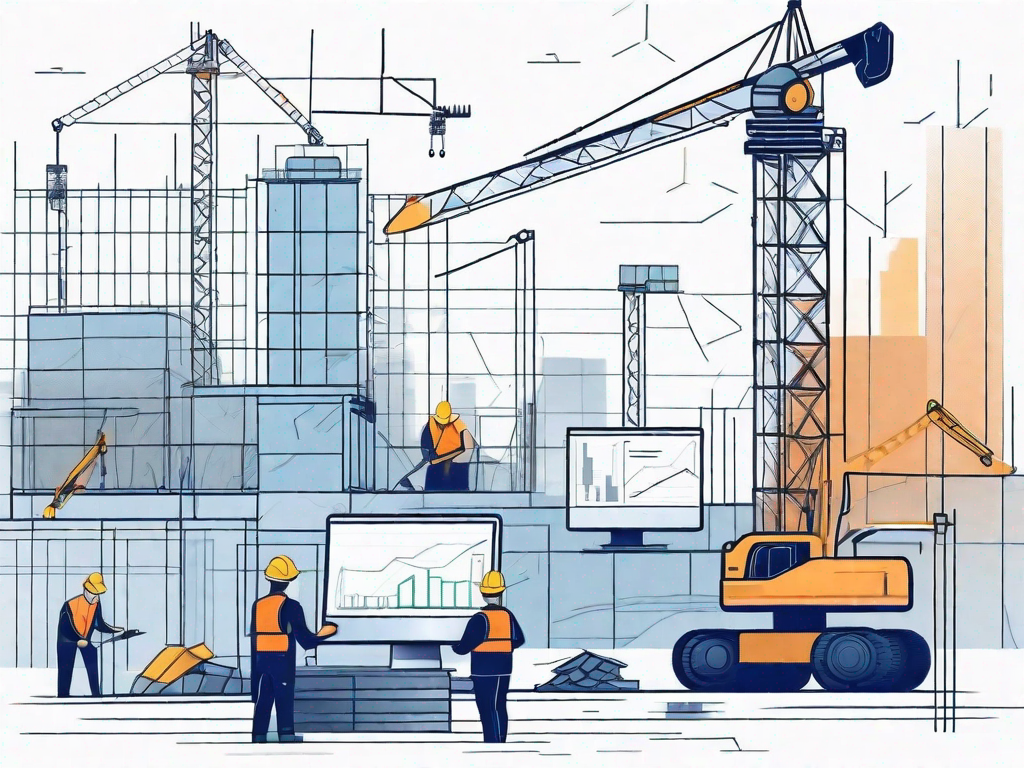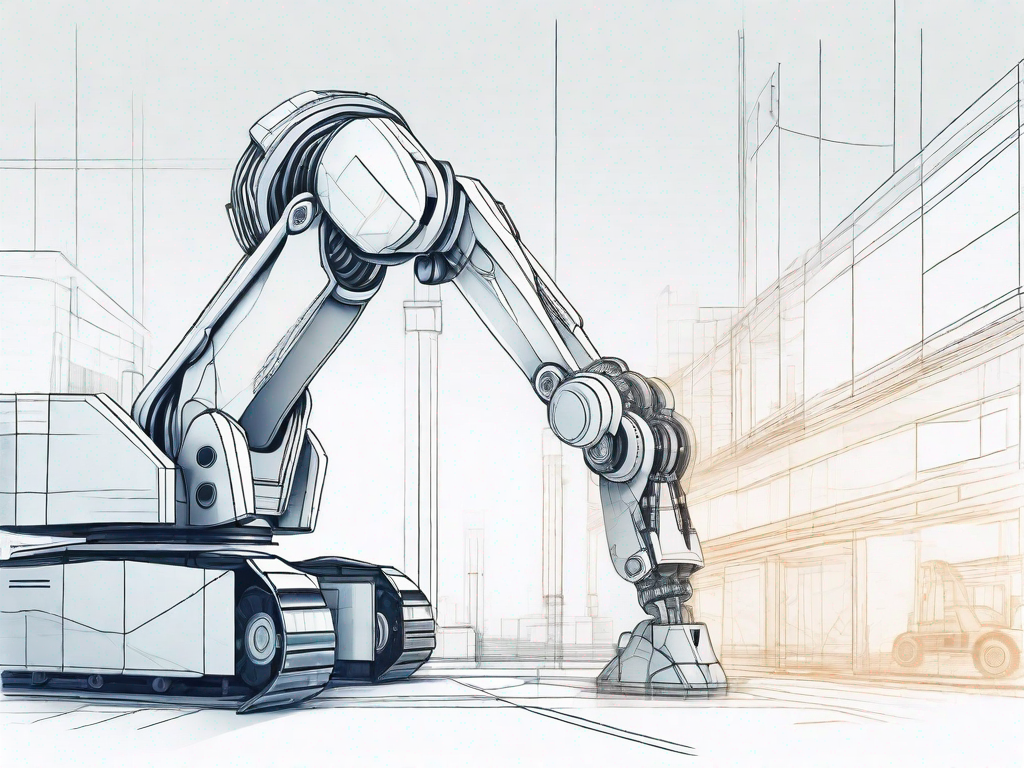Reports Made Right: Embracing AI in Construction Analytics
In the world of construction, accurate and timely reporting is essential. It provides valuable insights into project progress, identifies potential risks, and allows stakeholders to make informed decisions. However, traditional reporting methods often fall short in delivering the level of detail and efficiency required in today's fast-paced construction industry. This is where the power of Artificial Intelligence (AI) comes into play.
The Importance of Accurate and Timely Reports in Construction Analytics
Reports serve as a crucial communication tool in construction analytics. They provide a snapshot of project performance, enabling project managers to assess progress, identify bottlenecks, and make data-driven decisions. Accurate and timely reports ensure that stakeholders are well-informed, enabling them to take proactive measures and avoid costly delays.
When it comes to construction projects, staying on schedule is of utmost importance. Delays can lead to increased costs, unhappy clients, and damaged reputations. This is where accurate and timely reports play a vital role. By regularly generating and analyzing reports, project managers can identify any potential issues or deviations from the plan early on. This allows them to take immediate action and make necessary adjustments to keep the project on track.
Furthermore, accurate reports provide project managers with a comprehensive overview of the project's financial performance. They can track expenses, monitor budget allocations, and identify any areas where costs can be optimized. This level of financial visibility enables project managers to make informed decisions regarding resource allocation and cost control, ultimately contributing to the overall success of the project.
How AI is Revolutionizing Construction Analytics
The integration of AI in construction analytics has transformed the way reports are generated and analyzed. AI algorithms can process vast amounts of data quickly and accurately, enabling the identification of patterns, trends, and anomalies that might go unnoticed by human analysts. By leveraging AI, construction companies can gain deeper insights, make more informed decisions, and ultimately improve project outcomes.
AI-powered analytics have the ability to analyze data from various sources, such as sensors, drones, and IoT devices, in real-time. This allows project managers to have a comprehensive and up-to-date understanding of the project's progress. For example, AI algorithms can analyze data from on-site sensors to monitor the structural integrity of a building, identify potential safety hazards, and provide early warnings to prevent accidents.
Additionally, AI can automate the report generation process, saving valuable time and resources. With AI algorithms handling the data analysis and report creation, project managers can focus on interpreting the insights and taking appropriate actions. This not only improves efficiency but also ensures that reports are consistently accurate and reliable.
Benefits of Using AI in Construction Analytics
Implementing AI in construction analytics comes with a myriad of benefits. Firstly, AI-powered analytics streamline the reporting process, reducing manual effort and increasing efficiency. With AI algorithms handling the data analysis and report generation, project managers can save significant time and resources that would otherwise be spent on manual data processing and report creation.
Secondly, AI algorithms can identify patterns and trends that humans might miss, enabling more accurate forecasting and risk management. By analyzing historical project data, AI can identify recurring patterns and predict potential risks or issues that may arise in the future. This allows project managers to proactively address these risks, minimizing their impact on the project's timeline and budget.
Lastly, AI-driven analytics help in identifying areas for process improvement, leading to enhanced productivity and cost savings. By analyzing data from various construction projects, AI algorithms can identify inefficiencies or bottlenecks in the construction process. This insight enables project managers to optimize workflows, streamline operations, and ultimately improve overall project performance.
Implementing AI in Construction Analytics: Challenges and Solutions
While the advantages of AI in construction analytics are compelling, implementing AI-driven solutions does come with its own set of challenges. Overcoming these hurdles requires careful planning, strategic decision-making, and a collaborative approach.
AI has the potential to revolutionize the construction industry, providing valuable insights and improving efficiency. However, to harness the power of AI effectively, construction companies must navigate several challenges.
Overcoming Data Collection and Integration Challenges
One of the significant challenges in AI implementation is ensuring the availability of high-quality data. Construction projects generate vast amounts of data, but it is often scattered across various systems and formats. This fragmented data landscape poses a barrier to the successful implementation of AI-driven analytics.
To overcome this challenge, companies must invest in robust data collection and integration processes. They need to establish a centralized data repository that consolidates data from different sources, such as project management software, sensors, and IoT devices. By standardizing the data and ensuring its accessibility and reliability, construction companies can unlock the full potential of AI in analytics.
Furthermore, implementing AI in construction analytics requires data to be labeled and annotated accurately. This process involves human expertise and domain knowledge to train AI algorithms effectively. Construction companies must allocate resources and develop strategies to annotate data accurately, enabling AI models to learn and make accurate predictions.
Addressing Privacy and Security Concerns in AI-driven Construction Analytics
AI-driven analytics involves handling sensitive project data, which raises concerns about privacy and security. Construction companies must prioritize data protection and address these concerns to gain the confidence of all stakeholders.
To address privacy concerns, construction companies should develop comprehensive data governance policies. These policies should outline the guidelines for data collection, storage, and usage, ensuring compliance with privacy regulations. By establishing clear protocols and procedures, companies can demonstrate their commitment to protecting stakeholders' data.
In addition to privacy concerns, security is another critical aspect of AI-driven construction analytics. Construction companies must implement robust security measures to safeguard data from unauthorized access, breaches, and cyber threats. This may involve encryption, access controls, and regular security audits to identify and mitigate vulnerabilities.
Compliance with data protection regulations is also crucial. Construction companies must stay updated with the latest regulations, such as the General Data Protection Regulation (GDPR), and ensure that their AI-driven analytics processes align with these requirements. This includes obtaining consent from individuals for data collection and usage and providing transparency regarding data handling practices.
By addressing privacy and security concerns, construction companies can build trust with stakeholders and foster a positive environment for the implementation of AI-driven construction analytics.
Enhancing Decision-Making with AI in Construction Analytics
Artificial Intelligence (AI) has emerged as a game-changer in various industries, and the construction sector is no exception. With its potential to revolutionize decision-making, AI empowers stakeholders in construction analytics to make more informed and strategic choices. By harnessing the power of AI, construction companies can unlock a myriad of benefits that enhance project planning, risk management, resource allocation, and cost estimation.
Leveraging AI to Improve Project Planning and Risk Management
Project planning and risk management are critical aspects of construction management. Traditionally, construction managers heavily rely on historical data and their experience to anticipate potential risks and plan projects accordingly. However, AI algorithms can take this process to a whole new level. By analyzing vast amounts of past project data, identifying patterns, and predicting potential risks, AI enables construction managers to proactively address issues before they escalate. This proactive approach minimizes delays, reduces costly errors, and ultimately leads to better project outcomes.
Imagine a scenario where AI algorithms analyze data from previous construction projects, taking into account factors such as weather conditions, labor availability, and material costs. Based on this analysis, the algorithms can identify potential risks, such as delays due to adverse weather or shortages in materials. Armed with this information, construction managers can make informed decisions, such as adjusting project timelines or sourcing alternative suppliers, to mitigate these risks. The result is a smoother project execution, improved client satisfaction, and a more efficient use of resources.
Optimizing Resource Allocation and Cost Estimation with AI
Efficient resource allocation is a challenging aspect of construction management. Construction companies need to ensure that the right resources are allocated to each project at the right time, while also considering budget constraints. Additionally, accurate cost estimation is crucial to avoid overruns and maintain profitability.
AI offers a solution to these challenges by leveraging advanced algorithms and machine learning techniques. By analyzing historical project data, AI can identify patterns and optimize resource allocation. For example, AI algorithms can determine the optimal number of workers needed for a particular task based on past project performance and productivity levels. This ensures that resources are allocated efficiently, minimizing both underutilization and overutilization.
In addition to resource allocation, AI can also greatly enhance cost estimation accuracy. By analyzing historical data on material costs, labor rates, and other relevant factors, AI algorithms can provide more accurate cost estimates for construction projects. This not only helps construction companies avoid budget overruns but also enhances profitability and client satisfaction. Clients benefit from more accurate cost projections, allowing them to make informed decisions and plan their budgets accordingly.
Furthermore, AI can also factor in external variables that may impact resource allocation and cost estimation. For instance, AI algorithms can consider market fluctuations in material prices or changes in labor regulations, ensuring that construction companies stay up-to-date and adaptable in their decision-making process.
In conclusion, AI is revolutionizing decision-making in construction analytics. By leveraging AI in project planning, risk management, resource allocation, and cost estimation, construction companies can optimize their operations, minimize risks, and achieve better project outcomes. As AI continues to advance, its potential in the construction industry is limitless, promising a future of increased efficiency, profitability, and innovation.
Case Studies: Successful Implementation of AI in Construction Analytics
Real-life examples showcase the effectiveness of AI-driven construction analytics and provide valuable insights for companies considering its implementation.
Real-Life Examples of AI-driven Construction Analytics
One such example is a large-scale infrastructure project where AI algorithms were used to analyze project data, identify potential bottlenecks, and predict project outcomes. By utilizing AI tools, the project team successfully completed the project within deadlines and budget, achieving significant cost savings and minimizing risks.
Lessons Learned and Best Practices for AI Adoption in Construction Analytics
From these case studies, several lessons and best practices emerge. Firstly, investing in data collection and integration processes is crucial for effective AI implementation. Secondly, ensuring stakeholder buy-in and providing sufficient training and support is essential for successful adoption. Lastly, maintaining a balance between human expertise and AI-driven insights is key to maximizing the benefits of AI in construction analytics.
The Future of AI in Construction Analytics
The potential of AI in construction analytics is immense, and the future holds exciting possibilities for further advancements and innovations.
Emerging Trends and Technologies in AI-driven Construction Analytics
As technology continues to evolve, emerging trends in AI-driven construction analytics include the integration of IoT devices, drones, and augmented reality. These technologies provide real-time data, improve site safety, and enable enhanced collaboration among project teams.
Predictions for the Future of Construction Analytics with AI
The future of construction analytics with AI promises increased automation, predictive analytics, and enhanced decision-making capabilities. As AI algorithms become more sophisticated, construction companies will benefit from improved efficiency, reduced costs, and enhanced project outcomes.
In conclusion, AI is revolutionizing construction analytics by enabling accurate and timely reporting, enhancing decision-making processes, and boosting overall project performance. While challenges exist, the benefits of adopting AI in construction analytics far outweigh the risks. By embracing AI and leveraging its power, construction companies can unlock new opportunities and drive success in an increasingly competitive industry.





